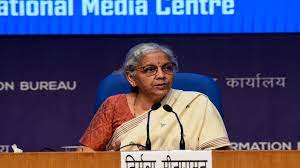
According to FISME, lack of competition in the banking sector (with 75 per cent of banks being in the public sector) and weak regulatory institutions, which have not been very successful in ensuring customer-centeredness of banks and near defunct grievance redressal mechanism (Office of Banking Ombudsman) coalesce into an unhappy experience for an ordinary MSME…
MSME body Federation of Indian Micro and Small & Medium Enterprises (FISME) has requested Finance Minister Nirmala Sitharaman in the Budget 2024 for reforms to increase access to finance for small businesses, highlighting the alleged anti-competitive practices by banks and unease in banking for MSMEs.
According to FISME, lack of competition in the banking sector (with 75 per cent of banks being in the public sector) and weak regulatory institutions, which have not been very successful in ensuring customer-centeredness of banks and near defunct grievance redressal mechanism (Office of Banking Ombudsman) coalesce into an unhappy experience for an ordinary MSME owner with banks.
For instance, foreclosure charges are levied by banks on prepayment of bank loans or when the borrower wants to change the bank due to unsatisfactory services. According to FISME, the charges range from around 2-4 per cent and are used as a coercive tool to force an MSME to stay put.
“What is disturbing is that such practices are in violation of RBI facilitated Code for MSEs that all Scheduled Commercial Banks are signatory which advises them that Micro and Small Enterprises be spared of such penalties. Except for ICICI Bank, no bank has announced an unambiguous policy for not charging foreclosure/ prepayment charges in spite of signing on the Code for MSEs,” the association said in a note ahead of the budget.
In addition to the foreclosure charges, FISME said many commercial banks levy non-compliance charges when an MSME borrower insists on changing bank. “RBI and Ministry of Finance need to be persuaded to put an end to these exploitative practices.”
FISME also noted that the Ombudsman scheme by the Reserve Bank of India (RBI) has failed to provide justice to hapless MSME borrowers and is seen siding with the bank rather than the customer.
“One of the most important lacunas in the scheme is that it is not mandatory for Ombudsman to deliver reasoned/speaking orders because of which most cases are just dismissed or decided arbitrarily without giving reasons,” it added.
The Integrated Ombudsman Scheme was launched in November 2021 to improve the grievance redress mechanism for customer complaints against entities regulated by RBI with one portal, one email and one address for the customers to lodge their complaints.
Another concern highlighted by FISME was related to Bank Loan Rating (BLR) wherein if the exposure of a bank to an MSME is beyond a threshold, the former insists on getting BLR which is a third-party rating from RBI or SEBI-approved rating agencies.
FISME said the RBI had clarified that BLR was an advisory for banks and not mandatory till their own risk assessment models would be ready. However, “the trouble is that historically these rating agencies were brought in to rate the listed companies for Return on Investment (ROI) and assign A,B,C type of ratings to inform retail investor. The same agencies were suddenly mandated to rate MSMEs for short-term ‘Solvency’ with the same set of formats. The results have been disastrous.”
As a result, MSMEs have not been able to get the investment grade rating which meant higher interest rates and demand for additional collateral security. To rub the salt in the wound, the practices of the rating agencies are monopolistic and rapacious, said FISME.